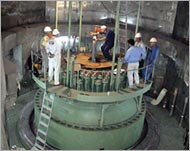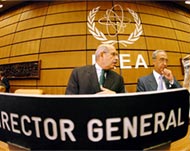Iran rejects nuclear handover call
Iran has said it will not exchange nuclear technology it has already developed for overseas help to meet its growing electricity needs.

The Iranian government said on Sunday it had already acquired the technology to produce its own nuclear fuel and it would be “irrational” to surrender such a capability in return for supplies from overseas.
“One should not put one’s fate in the hands of others. It would be irrational,” foreign ministry spokesman Hamid Reza Asefi said.
“We have the technology and there is no need for us to beg from others. This suggestion is good for countries that do not have this technology, but we do not need their generosity and help,” he added.
Asefi was reacting to US Democratic presidential candidate John Kerry, who has suggested providing Iran with nuclear fuel to generate electricity if the country agreed to give up its controversial work on the nuclear fuel cycle.
Fuel cycle work for peaceful purposes is permitted under the nuclear Non-Proliferation Treaty (NPT), of which Iran is a signatory, but the process can also be used to produce the core of an atomic bomb, which the US says Tehran is trying to do.
Self-sufficiency
 |
|
Iran says the programme is for |
But Asefi has repeated that Iran needs to be self-sufficient when it comes to fuelling its atomic energy programme, especially if it is aimed at fulfilling Iran’s growing energy needs.
“What guarantees are there? Will they supply us one day, and then if they want to, stop supplying us another day?” he asked.
Iran is under threat of being hauled before the UN Security Council amid Western and Israeli accusations it is seeking the “option” to develop nuclear weapons.
In a resolution passed on 18 September, the International Atomic Energy Agency (IAEA), which oversees the NPT, called on Iran to halt its uranium enrichment-related activities amid its ongoing investigations.
Resumption
In a controversial row, Iran suspended enrichment itself last year but has continued to advance on other parts of the fuel cycle, which Tehran says it reserves the right to resume at any time.
Asefi repeated that “we have not taken a decision yet” on resuming enrichment, but cautioned the IAEA against putting too much pressure on Iran.
 |
|
Critics say IAEA uses different |
Iran’s parliament has begun putting together a bill intended at resisting the IAEA demand and resuming the programme – a step certain to place Iran on a collision course with the UN’s nuclear watchdog.
“This bill is in its preliminary stages, and if the Majlis (parliament) approves it and the guardians council approves it and it becomes law, it is natural that the government is obliged to implement it,” Asefi said.
He said the Europeans, who appear to be under US pressure, should “understand the internal circumstances” in Iran.
The country says it is only developing the programme for electricity.
Iranians have long been accused by Israel and the US of having nuclear capabilities.
Neither the US nor Israel have, however, declared their own nuclear programmes and have never accepted an IAEA probe.